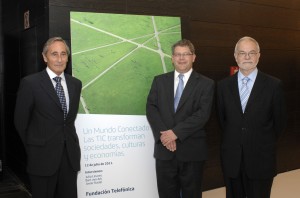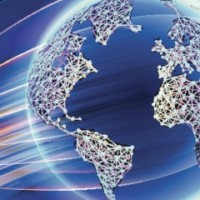
Telefónica Public Policy & Telefónica España Regulatory teams

The Linked World: How ICT is transforming Societies, Cultures, and Economies, is the result of a two-year research project led by The Conference Board with the support of Fundación Telefónica. The report of the project draws some conclusions, such as the following:
- Recent developments in Information and Communications Technology have driven improvements in living standards and changes in social and cultural developments around the world and have identified ways in which government policy, business strategy, and consumer behavior may encourage or constrain the realization of technology’s full potential.
- New relationships that technologies, such as ICT, engender can encourage and support innovation and enable integration of ideas, values, and cultures in ways that move societies forward. But technologies can also reinforce the isolation of those who lack access and skills, which, in turn, hampers their economic development and participation in culture and society. The interactivity of modern ICTs marks a new stage of innovation. These technologies are being used in ways that reinforce and alter existing relationships or even create entirely new relationships.
- Technology alone does not create economic growth and social progress. Relationships are the key to interactions between technology and its users—without people, none of the progress and social gains ICT enables would ever be possible. Ultimately, it will be the interaction between consumers, business and government that will decide where the next wave of technological innovation will lead and who will benefit from it.
Javier Nadal, Executive Vice-President of Fundación Telefónica, Bart van Ark, VicePresident and Chief Economist of The Conference Board and Julio Linares, Chief Operating Officer of Telefónica S.A. presented the report last 12th of July at Distrito C (Telefónica’s Headquarters in Madrid).
“Information and communication technology (ICT) has established itself as a general purpose technology — one that affects an entire economy. Over the past four decades, ICT has spurred dramatic changes, and these changes will continue for the foreseeable future. Harder to predict, though, is the exact nature of these changes, and how they will play out. There are increasing signs that ICT’s impact goes well beyond the economy. It is essentially transforming our society and the way human beings interact in social and cultural relationships, as well as in economic ones” says Bart van Ark.
“This book will provide guidance to what businesses, governments and other organizations can do to help drive the next wave of benefits that ICT will bring. The intention is to shed light on three broad questions:
- 1How is ICT driving living standards, as measured by societal and cultural development and economic growth, in the world’s advanced and emerging economies?
- 2How is the dissemination of ICT affecting the distribution of its benefits between and among various social, cultural, and economic entities?
- 3How does government policy, business strategy and consumer behavior either encourage or constrain the realization of ICT’s full potential?”
According to Julio Linares, “the future is going to be increasingly digital. The digitization of the world is going to go much further than merely our need to communicate with each other and to always be connected. “

Beatriz Gutiérrez García, Director at the Chairman’s Office of Telefónica S.A.









